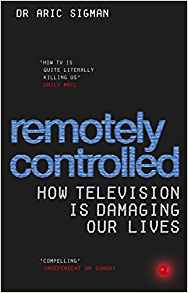
How’s your relationship with the drug in your living room?
I have an uneasy relationship with TV. There are a few programmes I like but I never watch it by myself, because there’s always so much else to do that I can’t justify the time. However, my husband watches it every evening, either concentrating on a string of films or comedy shows, or half-watching things as background entertainment while he works.
This frequently means I find myself sitting in the same room, supposedly doing something I want to do, but actually losing precious time as I am constantly distracted by whatever’s on the screen. Eventually I will tear myself away and get started on the things that I actually want to do or need to do, but I know those lost minutes…half hours if I’m honest…they all add up, and my lack of self discipline frustrates me.
But perhaps my failures are only to be expected, if we assess TV honestly, viewing it less as a ‘hobby’ or ‘pastime’ and more as a drug that seriously affects our lives. Why would we want to do this? Because TV doesn’t just encourage us to be ‘couch potatoes’; it actually rewires our brains.
What’s it about?
In ‘remotely controlled: how television is damaging our lives’, Dr Aric Sigman presents a compelling argument, fully supported by academic, scientific and medical research, for us all to critically consider and amend our viewing habits.
We all know that slumping on the TV for three or four hours each evening is not great for our health, but we’re used to thinking about TV expanding our waistlines, when we should also be thinking about it stunting our brains. Seriously.
Dr Sigman explains how watching too much television:
- slows the body’s metabolic rate;
- stunts the development of children’s brains;
- increases the likelihood of children developing ADHD;
- is a leading cause of half of all violence-related crime;
- lowers adult libido;
- is a major cause of depression.
What’s it like?
Very readable, well-researched and deeply frightening.
Sigman states in his introduction that ‘Television is a cultural force equalled in history only by religion…[and] the media and government…conduct society’s main discourse through television. Television is The Establishment.’ This, he says, is why the media is able to claim – like the smoking industry did for years and climate change deniers still try to – that the science is not settled, that TV is only one aspect, not the sole cause of society’s ills. And while TV may be one aspect, it’s a pretty huge elephant we’re (not) ignoring in the sitting room.
There are so many shocking facts in this book that I feel compelled to share, but it’s hard to know where to begin. Did you know that most people will spend more than twelve years of their life watching television? Or that persistently viewing young, idealised female bodies on television contributes to a significantly increasing divorce rate? (College professors, surrounded by young females every day, are significantly more likely to be seriously dissatisfied with their marriage as the primitive part of their brain subconsciously compares the ‘offer’ in front of them with their aging wife.)
Did you know that the prison service has discussed the benefits of television as a control mechanism? ‘As budgets and staff are cut and overcrowding rises, television’s tranquilising effects have been discussed at the highest levels of the prison service as the cheapest and most effective way to subdue the prison population.’ This is particularly disturbing in light of research into countries where television has been introduced late: rates of violence increased by at least 100%.
When the media do discuss television and violence, they tend to focus on ‘copycat’ crimes, but it doesn’t take violent content to cause violence: it is the medium itself that is depressing the rationalising effects of our frontal lobes and the sustained exposure to this medium that prevents socialising. Unlike reading, where our brains our actively decoding and interpreting information, viewing television has more in common with being hypnotised. The fact I found most shocking was that your brain actually uses less energy to watch television than it does when sleeping.
It’s not all doom and gloom, though. In part two of the book, labelled ‘untelevised’, Sigman discusses what we could be doing instead of watching television and the benefits that would accrue. There are some interesting points here, not least the worthwhile reminder that it is good to be bored – being bored stimulates creativity and imagination and is actually important for adults and children alike.
Final thoughts
Like Matthew Walker’s book on sleep, this is an important book that everyone should read, especially parents. Perhaps the key fact for parents is to be aware of the recommended viewing limits for watching television / playing computer games / surfing the internet:
- under three’s should not watch television at all (no benefits and it’s damaging their ability to pay attention);
- children over three should be limited to one hour a day (good quality tv only);
- teenagers should be limited to one and a half hours a day;
- and adults should be limited to two hours a day.
What I find difficult is that these suggested screen time limits include all internet use. This is surely impossible for most adults with a professional job, and by the time my children come home from school, they have probably already exceeded their screen time for the day in the name of ‘education’. (Film clips to illustrate how an animal forages as part of topic work…maths and literacy games to make their learning more interactive…iPad time as part of ‘golden time’ for working well.) Parents can and must play their part, but given the evidence of damage television and computer games in particular are doing to children, other elements of public life need a serious rethink.
Screen limits and the very real damage television does to our society must be discussed more and become something we understand in the same way we think about and discuss other activities which we enjoy but which we recognise need to be managed (e.g. eating sugary ‘treats’, drinking alcohol).
Highly recommended.
‘remotely controlled’,
Dr Aric Sigman,
2005, Vermilion, paperback


